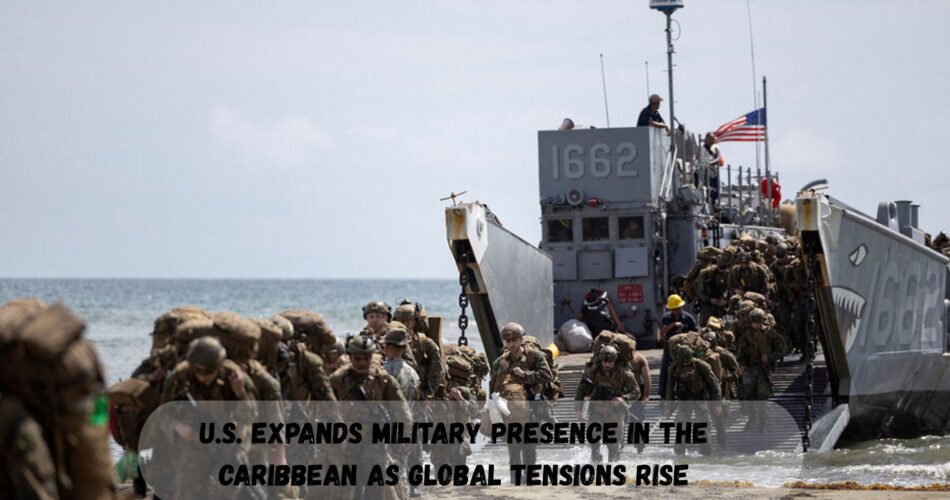November 2, 2025 — The United States is rebuilding and expanding its military footprint across the Caribbean in what experts describe as its most significant regional buildup in decades, according to a Reuters investigation. The upgrades include the modernization of key airfields and bases in Puerto Rico, signaling Washington’s renewed focus on strategic readiness amid growing global tensions.
- U.S. Military Upgrades in the Caribbean
- Trump Orders Military Readiness on Nigeria
- U.S. and China Reopen Military Communication Channels
- Ukraine Reinforces Pokrovsk Amid Heavy Fighting
- Israel Threatens to Intensify Strikes in Lebanon
- Canada Apologizes to U.S. Over Controversial Ad
- Tanzania’s Election Sparks Controversy
- What Comes Next
U.S. Military Upgrades in the Caribbean
The Reuters report found that the U.S. Department of Defense has begun large-scale infrastructure improvements across several Caribbean sites. These include:
- Reinforced airfields and hangars in Puerto Rico
- Enhanced radar and surveillance systems
- Expanded logistical support facilities for rapid deployment
Analysts say the buildup reflects Washington’s desire to project strength in the Western Hemisphere, secure maritime routes, and prepare for potential regional crises.
A Pentagon spokesperson declined to specify the total cost or timeline of the upgrades but called them “essential for maintaining operational readiness and regional stability.”
Trump Orders Military Readiness on Nigeria
At the same time, U.S. President Donald Trump has directed the Pentagon to prepare for “possible action” in Nigeria, accusing the government in Abuja of “failing to protect Christians” amid reports of sectarian violence.
Trump warned that U.S. aid to Nigeria could be suspended unless immediate steps are taken to prevent further attacks. The White House did not elaborate on what form any military response might take.
The Nigerian government has not issued an official reply, though a senior official told Reuters the claims were “exaggerated and politically motivated.”
U.S. and China Reopen Military Communication Channels
In a separate development, U.S. Defense Secretary Pete Hegseth met with Chinese Admiral Dong Jun during a regional defense meeting in Malaysia, where both sides agreed to reopen direct military communication lines.
The move follows months of tension in the South China Sea and Taiwan Strait. A joint statement described the talks as “constructive,” emphasizing the need to avoid miscommunication and reduce the risk of accidental conflict.
Ukraine Reinforces Pokrovsk Amid Heavy Fighting
In Ukraine, the army has deployed special forces to Pokrovsk as battles with Russian troops intensify. Army Chief Oleksandr Syrskii denied Russian claims that the city was encircled, saying Ukrainian forces “continue operations to repel the enemy.”
Independent observers reported heavy shelling in the Donetsk region, while local authorities confirmed civilian evacuations from nearby towns.
Israel Threatens to Intensify Strikes in Lebanon
Tensions are also rising in the Middle East. Israel has warned it will escalate strikes against Hezbollah targets in southern Lebanon, accusing the Lebanese government of ignoring the 2024 ceasefire agreement that required the militant group’s disarmament.
An Israeli military statement said recent rocket launches from Lebanon had violated the truce, prompting plans for “expanded operations” if attacks continue.
Canada Apologizes to U.S. Over Controversial Ad
Canadian Prime Minister Mark Carney has apologized to President Trump after a government-funded advertisement in Ontario used a clip of Ronald Reagan’s 1987 anti-tariff speech. Trump criticized the ad as “misleading and disrespectful.”
In a statement, Carney said the use of the footage was an “unintended oversight” and that the ad had been withdrawn. The incident briefly strained relations between Washington and Ottawa.
Tanzania’s Election Sparks Controversy
In Tanzania, President Samia Suluhu Hassan secured re-election with over 97 percent of the vote. The result has been marred by protests and reports of unrest after major opposition parties were excluded from the ballot.
International observers expressed concern about transparency and the fairness of the process, though the government insists the election was conducted lawfully.
What Comes Next
The developments highlight a week of rising geopolitical friction across multiple regions — from U.S. power projection in the Caribbean and Nigeria, to renewed U.S.-China military dialogue, and flashpoints in Eastern Europe and the Middle East.
Analysts say the coming weeks could test Washington’s ability to balance diplomacy with deterrence as it faces simultaneous crises across continents.

